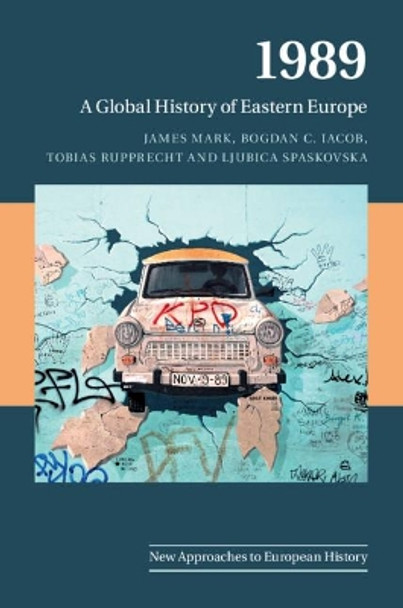Description
Placing Eastern Europe in a global context, this provides new perspectives on the political, economic, and cultural transformations of the late twentieth century.
About the Author
James Mark is Professor of History at the University of Exeter. He is the author of The Unfinished Revolution: Making Sense of the Communist Past in Central-Eastern Europe (2010), which was nominated for the Longman History Today Book Prize 2011 and selected as one of the 'best books of 2011' by Foreign Affairs. He is co-author of Europe's 1968: Voices of Revolt (2013) and co-editor of Secret Agents and the Memory of Everyday Collaboration in Communist Eastern Europe (2017) and Alternative Encounters: Eastern Europe and the Postcolonial World (forthcoming). Bogdan Christian Iacob is Associate Researcher in the Department of History at the University of Exeter. He is the author of Remembrance History and Justice: Coming to Terms with Traumatic Pasts in Democratic Societies (2015), The End and the Beginning: The Revolutions of 1989 and the Resurgence of History (2012), the editor of the special issue 'State Socialist Experts in Transnational Perspective. East European Circulation of Knowledge during the Cold War' published in the journal East Central Europe and co-editor of Ideological Storms: Intellectuals, Dictators, and the Totalitarian Temptation (forthcoming) with Vladimir Tismaneanu. Tobias Rupprecht is Lecturer in Latin American and Caribbean History at the University of Exeter. He is the author of Soviet Internationalism after Stalin: Interaction and Exchange between the USSR and Latin America during the Cold War (Cambridge, 2015). Ljubica Spaskovska is Lecturer in European History at the University of Exeter and a member of the Balkans Program Committee of the Association for the Study of Nationalities (ASN) World Convention at Columbia University, New York. She is the author of The Last Yugoslav Generation: The Rethinking of Youth Politics and Cultures in Late Socialism (2017).
Reviews
'This is a provocative volume that challenges the liberal Western account of the negotiated transition from Communism in 1989 by stressing the agency of East European reformers and intellectuals. It recontextualises the story as part of the global deradicalisation of socialism and interprets the region as an example of 'in-betweenness', at once part and opposite of the West.' Konrad H. Jarausch, University of North Carolina, Chapel Hill
'A remarkable scholarly achievement which compels us to rethink the Eastern Europe transition of 1989 in a global context, dispensing with a Western triumphalist view of the end of the Cold War. Through painstaking detail and incisive analysis, this shows us the ways in which East Europeans continue to navigate their own political paths.' Mary Neuburger, University of Texas, Austin
'Laying waste to all lingering cliches of the walled hermit kingdoms of socialist-era Eastern Europe, the authors restore the history of Cold War Eastern Europe to the world, depicting it as a region entangled in global supply chains and transnational lines of political influence long before 1989. The authors refuse simplistic narratives of convergence and help explain the contemporary challenges of nativist nationalism.' Quinn Slobodian, Wellesley College, Massachusetts
'This excellent book contributes to the recent trend in bringing together Eastern European and global history, and shows the fruitfulness of collective book writing.' Philipp Ther, Universitat Wien
'1989: A Global History of Eastern Europe offers a nuanced and sobering account of the global context of the fall of the Eastern Bloc and its role in the construction of post-Cold War Europe ... makes a unique and necessary contribution not just to the historiography of the revolutions of 1989, but also to our understanding of the rightward drift in contemporary Eastern Europe.' Nick Ostrum, EuropeNow
'A must-read for every historian who deals with Eastern Europe after 1945 and especially after 1968. It shows the importance of history for explaining contemporary situations and inspires historians to draw out their research up to the present and to intervene in the public sphere.' Lubos Studeny, Prague Economic and Social History Papers
'Using a global approach, this extraordinary book, which was written by four authors, who all teach history at the University of Exeter as specialists of different regions (James Mark/Central Europe, Bogdan C. Iacob/Eastern Europe, Tobias Rupprecht/Latin America, and Ljubica Spaskovska/former Yugoslavia), critiques and revises a number of popular aspects of this Eurocentric myth of 1989 ... an important contribution to our understanding of today's world.' Arpad von Klimo, H-Diplo
'This ambitious, rich, and necessary book is the first comprehensive scholarly synthesis of the global reach of Eastern Europe from late socialism in the 1970s to the postsocialist transition after 1989 through the illiberal turn following 2008. Cowritten by four specialists on Hungary, Romania, Yugoslavia, and the Soviet Union, 1989: A Global History of Eastern Europe is a model for collaborative work melding regional expertise in a genuinely comparative, transnational analysis.' Theodora Dragostinova, The American Historical Review
'... rich, thought-provoking account of 1989. Without doubt, the monograph will spark academic discussions and will open new avenues for research on this hotly debated period. It thus will be on the recommended list for any scholar interested in the history of the region, its global context, and its ongoing reverberations.' Ruzha Smilova, Southeastern Europe
'... 1989 is probably the best transregional history of 1989 one can read today ...' Judit Bodnar, Slavic Review
Book Information
ISBN 9781108427005
Author James Mark
Format Hardback
Page Count 380
Imprint Cambridge University Press
Publisher Cambridge University Press
Weight(grams) 650g
Dimensions(mm) 235mm * 156mm * 25mm










